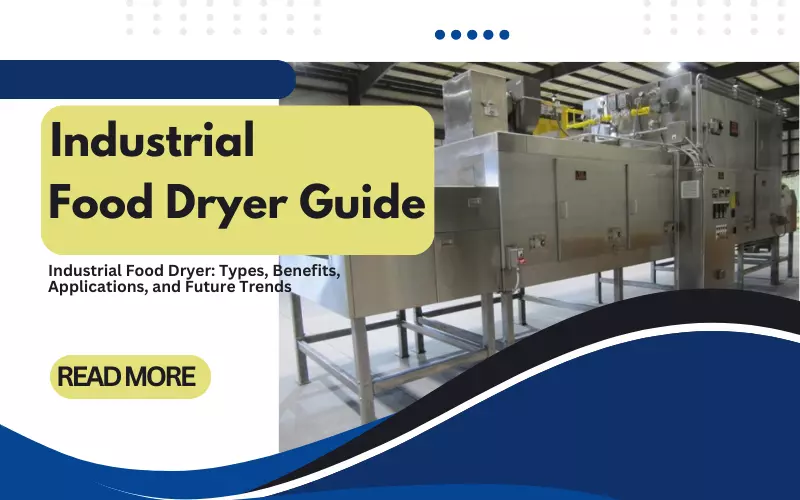
Industrial Food Dryer: The Ultimate Guide
Humans have been preserving food for ages. The process enhances the food’s shelf life and prevents spoilage.
In ancient times, open drying and salting were standard food preservation methods. However, food preservation techniques have evolved a lot over time.
Today, advanced machines are utilized to minimize the growth of microorganisms in food. One such machine is – an industrial food dryer.
Also known as a commercial food dryer, this food drying machine eliminates moisture from food. It can dry various types of foods on a large scale.
If you want to buy a commercial dehydrator, this blog post is for you. It discusses the benefits, and applications of an industrial food dryer.
Before we jump on these sections, let us learn why food preservation is crucial.
Importance of Food Preservation and Processing
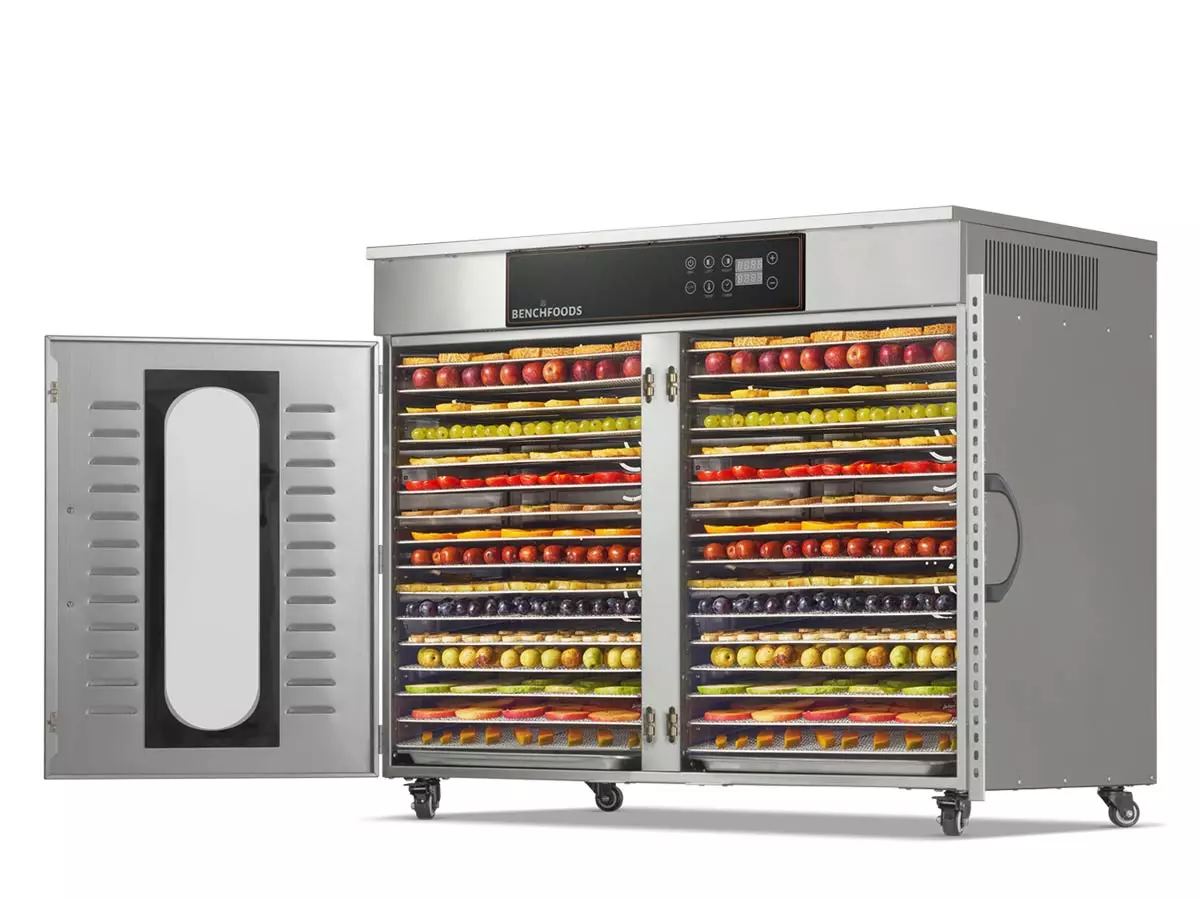
Providing safe and wholesome food to nationals is a crucial yet challenging task for every country. It is not possible without a proper food processing and preservation system.
Food preservation guarantees the availability of safe and quality food. It improves the shelf life of food and retains its nutrients for a long time. It naturally minimizes food wastage.
Food preservation also has a significant role in making diverse foods available throughout the year.
How Does an Industrial Food Dryer Work?
The working of an industrial dryer machine may vary based on its model, design, and heat source. Nevertheless, the basic principle is the same in every food drying machine.
Generally, an industrial dryer machine features a drying compartment. It is where food is put for drying. This compartment is a walled space that lets heat air come inside and dry food.
The heat source for the machine can be natural gas, electricity, biofuel, steam, etc. The commercial dryer releases hot air into its chamber to dry the object inside. The air heat circulates throughout the chamber with the help of a blower or fan.
Let us learn what makes an industrial dryer machine different from conventional preservation methods.
What Makes Industrial Food Dryer Different from Other Preservation Methods?
The demand for industrial food dryers is continuously growing. A report reveals that the global food dehydrators market may reach USD 3.51 billion by 2030. This estimated growth would happen with a CAGR of 6.12%
Industrial Food Dryer vs. Canning
Canning is one of the famous traditional food storage solutions. It involves sealing food in an airtight vessel.
Canning can extend the shelf life of food up to 5 years under ideal circumstances. Unfortunately, the canning process is a time-taking process.
Commercial food dryers remove moisture from food and stop the growth of bacteria. Furthermore, it is a quick process.
Industrial Food Dryer vs. Freezing
Freezing is another conventional method for food preservation. As the name indicates, the process involves preserving the food at freezing temperatures.
It stops the growth of bacteria and enzymes. Furthermore, it also preserves the nutritional value of food.
On the other hand, an industry food dryer preserves food by removing its moisture content. It is better in terms of drying efficiency and versatility.
Industrial Dryer vs. Refrigeration
The refrigeration process works similarly to freezing. Food is not frozen entirely but rather refrigerated.
Refrigeration maintains the quality of the food. However, it can’t preserve crops and grains. Moreover, refrigeration can’t preserve your food for a long time.
An industrial food dryer can preserve fruits, vegetables, nuts, etc.
Each food-preserving technology has different applications. They cannot take each other’s place. Even industrial food dryers have various types and models. Let’s learn more about them.
Types of Industrial Food Dryers
You can find various types of industrial food dryers in the market. Each meets distinct food production needs. Below are some popular industrial food dryers.
Drum Dryer
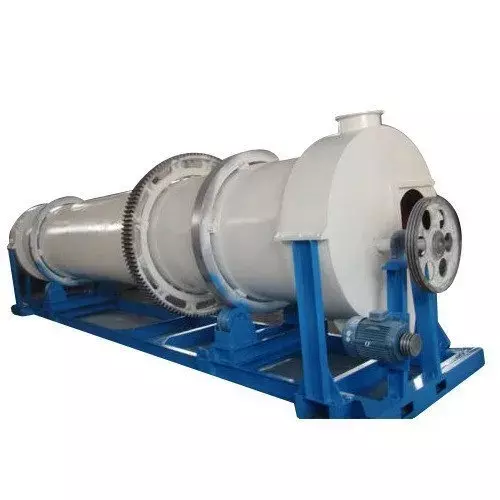
A rotary drum dryer is one of the most popular food-drying equipment. It features a rotating drum in which food is exposed to hot air to vaporize the moisture.
This industrial dryer machine dries the food gently without disturbing its texture and overall quality.
These machines are efficient and durable and can dry food in bulk. The machine can eliminate moisture from a wide range of fruits, vegetables,
Apart from food, it has uses in various other industries. For example, the use of a rotary dryer in the chemical industry is well-known. Drum dryers are available in different sizes.
Tray Dryer
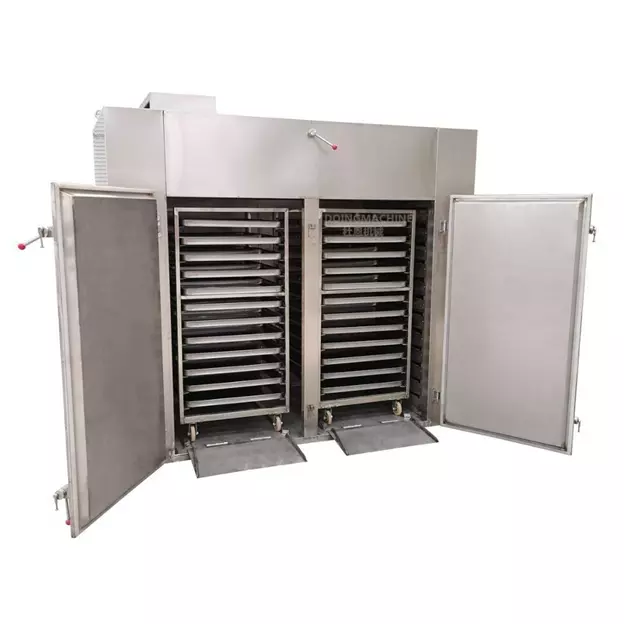
A tray dryer is another common industrial food dryer on the list. The dryer has a drying chamber where several food trays are placed together. Trays are arranged in a manner that looks like a rack. Food gets dried with hot air, circulating in the chamber.
The tray dryer is suitable for drying foods like grains, vegetables, nuts, etc.
Spray Dryer
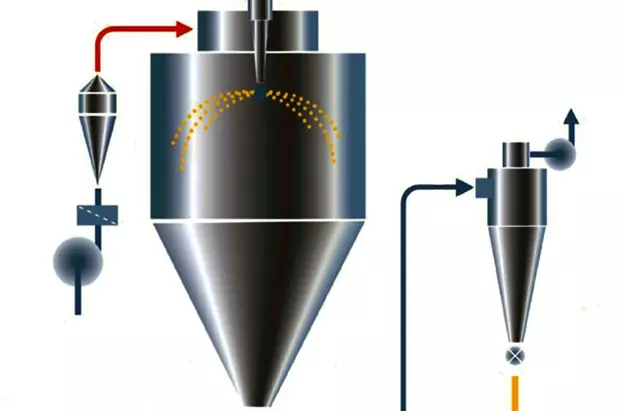
Primarily, spray dryers have uses in the pharmaceutical and food industry. They remove liquid from concentrated liquid food.
Generally, the machine consists of a feeder, drying chamber, hot air managing system, and dried particle collector. In the food industry, a spray dryer helps in preserving the fragrance and flavor of liquid food.
Belt Dryer
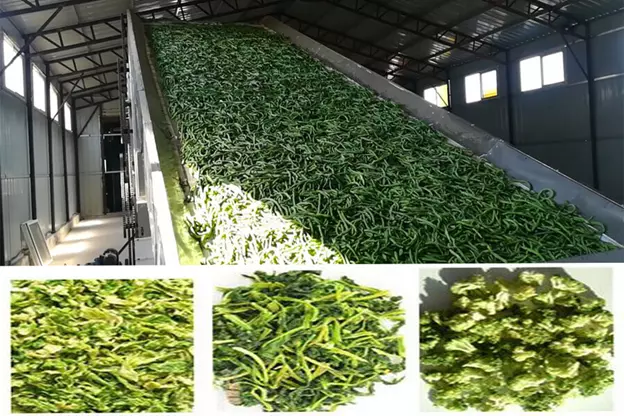
A belt dryer is a commercial food dryer comprising a conveyor belt. An operator places the food over the belt, which travels through a hot drying chamber.
As the conveyor belt moves, the hot air dries the food. The machine is ideal for drying vegetable and fruit pieces.
Advantages of Using an Industrial Food Dryer
Different industries have been using industrial food dryers for distinct purposes. It offers various benefits that are not possible with conventional moisture removal techniques.
Some primary advantages of using an industrial dehydrator include:
Extends Shelf Life of Foods
Keeping food fresh and nutritional rich is the biggest challenge in the food production industry. Fortunately, with industrial food dryers, it is possible.
Since the machine removes the moisture, it stops the breeding and growth of yeast, mold, bacteria, and microorganisms in the food.
Nutrient Preservation
Commercial dehydrates improve the shelf life of food and also maintain its nutritional value.
The machine gently dries the food helping in retaining its natural nutrients. This food-preserving technique causes negligible loss of minerals, vitamins, and antioxidants.
Enhances the Flavor
Several people do not realize that this industrial drying system also improves the flavor of the food.
The machine removes water from the food to make its flavors more intense. The advantages of an industrial food dryer are not limited to this. This innovative drying technology improves the overall quality of the food.
Applications of Industrial Food Dryers in Different Industries
Food Processing Sector
The food processing industry uses industrial food dryers in various food processing applications.
Dryers help in improving the shelf life of fruits and vegetables.
Furthermore, the drying equipment enhances the shelf life of dehydrated food products. These products could be nuts, seafood, herbs, etc.
Agriculture and Farming Industry
The use of an industrial food dryer in the agriculture sector is crucial. It helps in drying harvested fruits and vegetables.
In addition, farmers use this machine to dry crop seeds. It keeps seeds safe until farmers sow them.
The dryer is suitable for drying sunflower seeds, soybean seeds, corn seeds, and more.
Farmers also use this industrial food dryer to remove moisture from coffee beans, nuts, livestock, and manure.
Pet Food Production
The industrial food dryer plays a significant role in processing snacks and foods for pets. It enhances the flavor, shelf life, and texture of pet food. Dried fish, meat, and fruits are processed with a commercial food dryer.
No matter what industry you belong to, an industrial food dryer must meet your requirements.
Follow the below tips to choose the perfect industrial food dryer for you.
How to Choose The Right Industrial Food Dryer
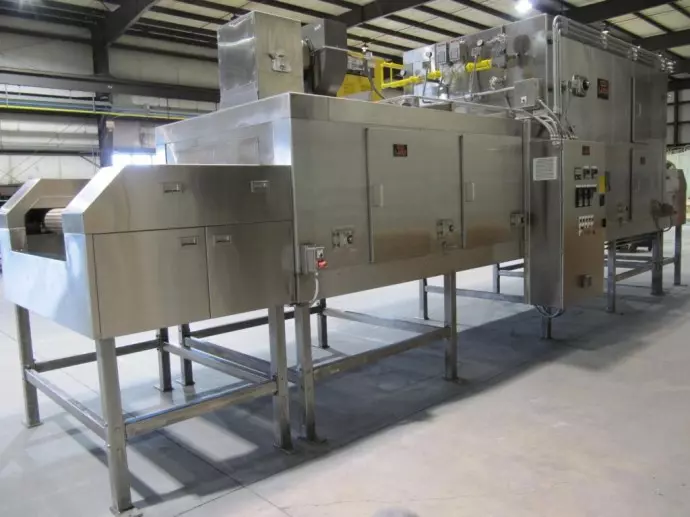
Capacity and Size Consideration
No one wants to buy food drying equipment that is too small or too big for their requirements. First, consider the type of food you will be drying. Also, find out how much you need to dry food.
As mentioned above, commercial food dryer machines are available in different models and sizes. Assess what model would fit your requirements.
Energy Efficiency
Though it may be a minor concern for some people, it matters in the long run. An energy-efficient food drying equipment reduces the overall operation cost to a great extent. In addition, it causes less harm to the environment.
Go for an industrial drying machine having energy-efficient design and features. Look for features like an airflow management system, automatic lubrication, heat recovery system, etc.
Some food dryers can do food cleaning, cooling, shredding, and separating, besides drying.
Learn about the heat source of the machine. Some commercial food dryers use electricity, natural gas, and steam, while others run with renewable energy.
Find out which machine type will be more energy efficient for you.
Customization for Specific Food Types
Make sure the industrial food dryer you invest in can dry various foods. As different foods have distinct moisture content, the dryer must have the option to set the temperature accordingly.
In addition, you must be able to regulate airflow, drying time, and humidity.
Sometimes, people have a specific requirement depending on their food product unit. Such individuals can ask their manufacturer for custom food dryers.
Challenges and Solutions of an Industrial Food Dryer
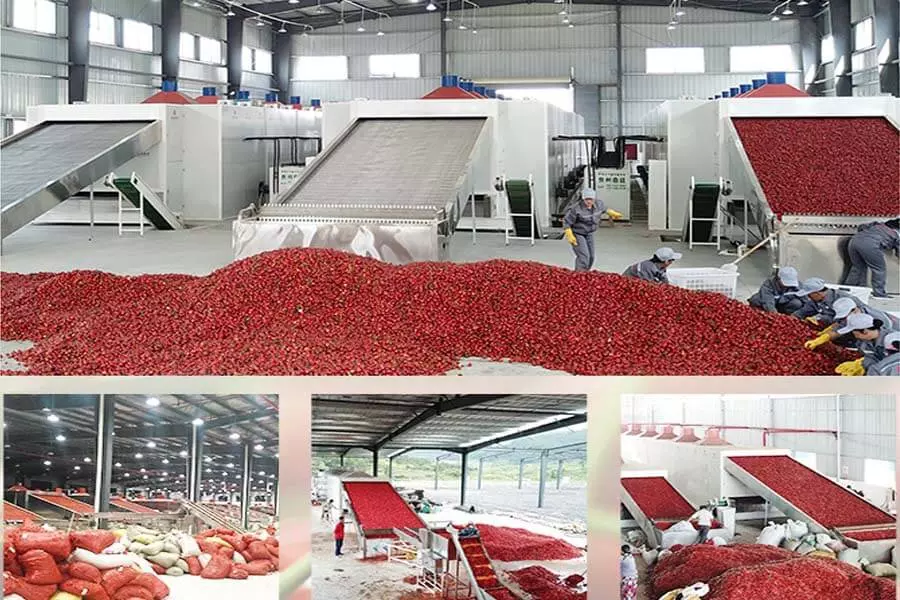
When operating an industrial food dryer, you may have to deal with a few challenges. The two most common challenges include:
Uniform Drying
It can be challenging to ensure uniform drying when operating a commercial food dryer. Since every food is different in shape, size, and nutritional value, you cannot set the same drying temperature. It might end up affecting the food quality and flavor.
Solution
The operator must know how to set the drying temperature to meet different requirements.
Do not overload the chamber with food. It must have space to let the air circulate inside and dry food from all sides. Optimize the function of fans to ensure proper air circulation
It is advisable to cut food into even sizes to ensure uniform drying. It will avoid the chance of over and under-drying.
If required, ask your industrial dryer manufacturer to install a moisture sensor in the drying chamber. It will help the operator measure all the drying parameters.
Addressing Safety and Hygiene Concerns
Safety and hygiene are crucial considerations in the food processing industry. Choose an industrial food dryer machine that helps you deal with these. Ensure your commercial food dryer has the following features.
Temperature Monitoring System & Automatic Shutdown
Overheating can lead to fire and significant damage to the dryer. You can prevent this situation by buying a dryer with temperature monitoring and an automatic shutdown system.
Cross Contamination
Cross-contamination happens because users dry various foods in the same dryer. To prevent this situation, enforce strict cleaning protocols in the place.
Instruct machine operators to clean and sanitize the chamber before proceeding with any drying process. Sanitize conveyor belts and trays as well.
If you have concerns about foreign object contamination, use metal detectors to remove them.
Maintenance of an Industrial Food Dryer
Time-to-time maintenance extends the lifespan of an industrial food dryer and guarantees safe operation.
Follow the below steps to maintain your machine.
Regular Inspections and Preventive Maintenance
First, implement a maintenance schedule. It will ensure that your food dryer is undergoing regular inspection.
Look for the signs of damage. Check for loose screws and nuts and any foreign objects in the chamber.
In addition, make sure fans and heating elements are working efficiently.
Cleaning and Lubrication
- Clean and sanitize both the interior and exterior of the dryer. There should not be any food residue left.
- Operators can use brushes and vacuum cleaners for deep cleaning. It is advisable to use a food-grade cleaning agent.
- Lubricate all the moving parts of the machine, such as chains, bearings, and rollers.
- Train all employees of your food processing plant about cleaning procedures.
Safety Measures for Operating an Industrial Food Dryer
Although industrial food dryers are safe and easy to use, take certain safety measures.
Some safety points to consider are as per below:
Employee Training and Guidelines
Give initial training to your machine operators. They must be aware of how to start/stop the machine and control drying efficiency.
Set clear safety guidelines that every worker must follow. All the operators must wear safety goggles and heat-resistant clothes when operating the machine.
Fire Prevention and Safety Precautions
Operators must ensure that there is no flammable material nearby. Inspect all the electrical connections and switches carefully before starting the machine.
Additionally, the food processing unit must have proper ventilation. Have a proper fire suppression system in place to prevent fire from spreading.
The industrial drying system must have an emergency stop button for emergencies.
Innovations and Future Trends of Industrial Food Dryers
Over the past few years, we have witnessed significant advancement in industrial food dryers. Modern commercial food dryers are IoT-enabled.
Operators can optimize and monitor drying efficiency in real time. Some models let users monitor drying parameters remotely.
Industrial food dryers have hybrid drying systems. These dryers combine multiple drying technologies.
For example, along with hot air drying, they may have electric microwave heating.
In addition, the latest industrial food dryers come with AI and machine learning capabilities.
These food dryers can optimize drying conditions and perform accordingly. In the future, you can see more advancement in food dryers.
Regulations and Compliance
The industrial food dryer you buy must meet the required compliance and regulations.
Two major compliances for the machine are below:
FDA Guidelines
FDA stands for the US Food & Drug Administration. The agency regulates the quality and safety of food products.
It requires industrial food dryer manufacturers to use food-grade material, facilitate easy-to-clean design and conduct good manufacturing practices.
Food Safety Certifications
Food safety certifications validate that a particular industrial food dryer has a design and body structure that ensures food safety.
Some popular food safety certifications include NSF, ISO 22000, HACCP certification, CE, etc.
These certifications might vary depending on the jurisdiction of the manufacturing unit. If you import an industrial food dryer, ask your manufacturer to comply with the required certification.
Cost Analysis and ROI
The initial setup cost of an industrial food dryer is indeed huge. However, you can expect a good return on investment in the long run. Industrial food dryers are comparatively energy efficient and require low maintenance.
It is advisable to be realistic when making ROI calculations. The pricing of food products, the maintenance cost of the machine, and ever-changing market conditions can impact ROI.
Environmental Impact of Industrial Food Dryer
Industrial food dryers have low energy consumption compared to conventional machines. The machine provides consistent hot air that dries with efficiency. It naturally mitigates the environmental impact.
Industrial food dryers have a vital role in minimizing food wastage. It helps in improving the shelf life of food and minimizing its spoilage.
Conclusion
An industrial food dryer is an essential machine in the food processing industry. This blog post highlights the functionality of the industrial food dryer and explains its advantages.
In addition, it makes you aware of its application in different industries and tips to choose the ideal machine for you.
The growing demand for industrial food dryers indicates that more and more companies are employing it. With technological advancements, you may see more AI features in commercial food dryers.
Talk to An Expert
SHARE THIS POST
Talk to An Expert
